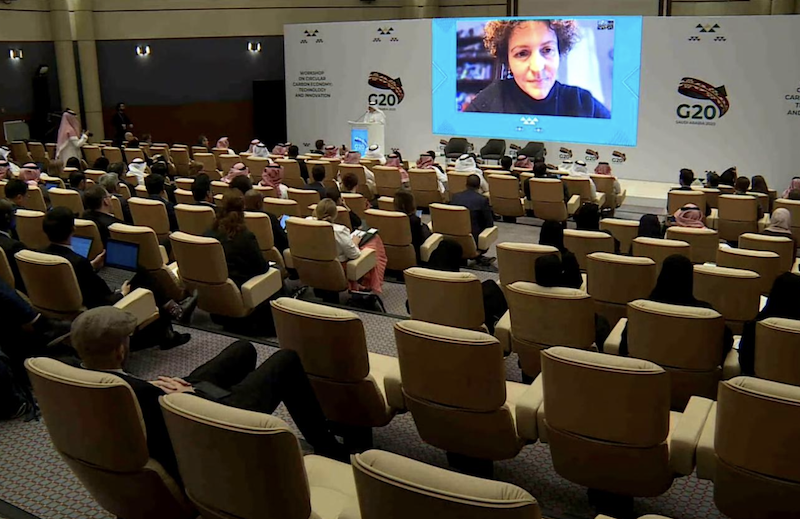Driving food towards change: reflection bites from Sara Roversi at the G20 Climate Stewardship Working Group
The Future Food President, Sara Roversi, was invited as a keynote speaker at the workshop of the G20 Climate Stewardship Working Group (CSWG) on Circular Carbon Economy Technology & Innovation, held on March 1-2 in Riyadh.
This is a side event to the first of three Climate Stewardship Working Group meetings leading up to the G20 Leader’s Summit this November under the Saudi Presidency.
Other participants in the Workshop included representatives from FAO, G20 Ministries of Agriculture, TMG, IEA, and OECD.
Sara Roversi shared her perspective during the session “Circular Carbon Economy in the Food Sector” speaking about “The future of food: emissions-neutral products,” providing a view on how emissions neutrality can be achieved on the product level. The audience included members of G20 member nations and invited countries’ delegations, international organizations, and participants from think tanks as well as the global private sector community.
“Food is life, to such an extent that it is listed among the basic human rights. Food is energy, nourishment, sociality; it is the vehicle of values, culture, symbols, identity.
But the agri-food system is also a major driver of climate change, with its contribution between 25-30% of global greenhouse gases emissions (GHG) in the atmosphere.
Therefore, focusing on climate-smart solutions is not only a mere definition well-fitting within the era of the Fourth Industrial Revolution but an urgent necessity to implement in order to achieve the three pillars of sustainable development: People,* Planet** and Prosperity***.
As we cannot separate food security from our reliance on limited natural resources, and food transversally touches all the SDGs, only a form of innovation with low environmental impact is able to maximize agriculture productivity, to boost resource efficiency and to grow more nutritious food. In this sense, IoT technologies and digitalized monitoring systems help us to massively reduce land and water consumption. To manage carbon emissions in the food sector, we cannot even ignore the need for an ecosystem-based adaptive transition. As the FAO recommends, in the short term this can lead to reduce or remove GHG emissions where possible, such as choosing crop production according to specific weather conditions of the area or opting for carbon offsets. But in the long run, nor mechanisms of adaptation and mitigation alone will be sufficient to move towards a significant ecological transformation, both in terms of environmental and ethical preservation.
Research reveals that stringent climate mitigation policies can conflict and compromise food consumption and global hunger. The goal that we have been aiming at within the Future Food Institute is actually developing disruptive innovations in food production from a holistic perspective, meaning that a radical cultural innovation has to precede a pure technological one. Societal changes imply, for example, to prefer nourishment low in carbon footprint, such as the Mediterranean diet, or finding alternative to the traditional animal-based proteins. That is far more than simply imposing different educational patterns on consumers from the top; it rather requires a bottom-up approach that strengthen resilience, regenerate the environment and all the precious services it provides.
*Starting with the first one, People, by 2050 resource scarcity is predicted to cause 10% reduction of the global crop production, while forcing 700 million individuals to become environmental migrants. These provisions, in contrast with the urge for food production to increase at least by 60% and meet the needs of the world population, expected to reach 9.7 billion people by 2050, clearly exacerbate the challenge of feeding present and future generations.
**Also the second pillar, Planet, is going to be heavily compromised without an imminent and thorough climate-smart approach. Nearly two thirds of global ecosystems have been degraded, due to climate change, urbanization, socio-economic development and inefficient policies. It is revealing that UNCCD reports already 13 countries only from the European Union to have declared to desertification alert.
***Equally, climate-smart solutions represent a massive opportunity in terms of Prosperity: $2 billion has been invested in these “circular carbon” companies to date, developing the potential for becoming one of the most important industries of the 21st Century.”

